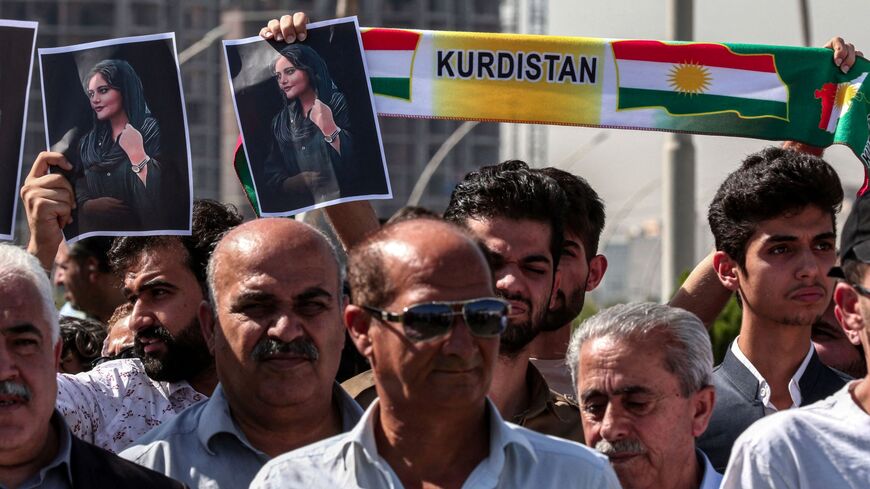
Men hold up signs depicting the image of 22-year-old Mahsa Amini, who died while in the custody of Iranian authorities, during a demonstration denouncing her death by Iraqi and Iranian Kurds outside the UN offices in Arbil, the capital of Iraq's autonomous Kurdistan region, on Sept. 24, 2022. -
SAFIN HAMED/AFP via Getty Images
Elizabeth Hagedorn
@ElizHagedorn
November 2, 2022
As protests sparked by the death of Iranian-Kurdish woman Mahsa Amini rage in Iran, members of the country’s exiled Kurdish political opposition say they’re not getting a fair hearing in Washington. Khalid Azizi, spokesperson of the Democratic Party of Iranian Kurdistan (KDPI), is calling on the US government to resume contact with his and other Iranian political parties.
“Unfortunately, we don't have any contact with them,” Azizi told Al-Monitor at a recent event hosted by the Washington Kurdish Institute. “They should have some level of relationship with the Iranian political parties.”
KDPI is one of several Iranian opposition groups based in northern Iraq that is seeking greater autonomy for Iran’s Kurds, who comprise an estimated 10% of the Iranian population. Tehran has accused KDPI and other armed “separatist” groups of organizing the protests, now in their seventh week.
In apparent retaliation, KDPI’s headquarters in the semi-autonomous Kurdistan Region of Iraq came under attack in late September from Iran’s Islamic Revolutionary Guard Corps. The Iranian missile and drone strikes killed eight people, including an American citizen who was a retired peshmerga fighter.
Officials with KDPI and its historic rival Komala say they’re unable to secure meetings with Biden administration officials, despite maintaining offices in Washington and having met with past US administrations. Those engagements ended after then-Secretary of State Mike Pompeo ordered American diplomats in January 2020 to avoid meeting with Iranian opposition groups he accused of trying to gain the appearance of tacit support in Washington.
The Iranian Kurdish opposition has historically been weaker than similar movements in Syria, Iraq and Turkey, which have better funding and organization.
“Even in the diaspora, where you have the opportunity to organize and mobilize, they were not able to muster transnational support the way that others did,” said Denise Natali, author of “The Kurds and the State” and director of the National Defense University’s Institute for National Strategic Studies.
Asked whether the State Department has met with the exiled Kurdish opposition parties amid the protests, a department spokesperson told Al-Monitor, “we’re not going to detail or comment on any engagement with any outside groups ... However, it is clear that these popular protests have nothing to do with outside groups.”
The administration has gone out of its way to avoid characterizing the protesters’ demands, despite many openly calling for the Iranian government’s toppling. It’s even less likely the administration would show any hint of support for political actors espousing regime change or greater autonomy for Iran’s minorities, observers say.
But Azizi maintains that talking to his and other Kurdish groups would offer the United States a different point of view.
“The United States must have some sort of relationship with the Iranian people,” Azizi said. “And it should be done through these political parties.”
Elizabeth Hagedorn
@ElizHagedorn
November 2, 2022
As protests sparked by the death of Iranian-Kurdish woman Mahsa Amini rage in Iran, members of the country’s exiled Kurdish political opposition say they’re not getting a fair hearing in Washington. Khalid Azizi, spokesperson of the Democratic Party of Iranian Kurdistan (KDPI), is calling on the US government to resume contact with his and other Iranian political parties.
“Unfortunately, we don't have any contact with them,” Azizi told Al-Monitor at a recent event hosted by the Washington Kurdish Institute. “They should have some level of relationship with the Iranian political parties.”
KDPI is one of several Iranian opposition groups based in northern Iraq that is seeking greater autonomy for Iran’s Kurds, who comprise an estimated 10% of the Iranian population. Tehran has accused KDPI and other armed “separatist” groups of organizing the protests, now in their seventh week.
In apparent retaliation, KDPI’s headquarters in the semi-autonomous Kurdistan Region of Iraq came under attack in late September from Iran’s Islamic Revolutionary Guard Corps. The Iranian missile and drone strikes killed eight people, including an American citizen who was a retired peshmerga fighter.
Officials with KDPI and its historic rival Komala say they’re unable to secure meetings with Biden administration officials, despite maintaining offices in Washington and having met with past US administrations. Those engagements ended after then-Secretary of State Mike Pompeo ordered American diplomats in January 2020 to avoid meeting with Iranian opposition groups he accused of trying to gain the appearance of tacit support in Washington.
The Iranian Kurdish opposition has historically been weaker than similar movements in Syria, Iraq and Turkey, which have better funding and organization.
“Even in the diaspora, where you have the opportunity to organize and mobilize, they were not able to muster transnational support the way that others did,” said Denise Natali, author of “The Kurds and the State” and director of the National Defense University’s Institute for National Strategic Studies.
Asked whether the State Department has met with the exiled Kurdish opposition parties amid the protests, a department spokesperson told Al-Monitor, “we’re not going to detail or comment on any engagement with any outside groups ... However, it is clear that these popular protests have nothing to do with outside groups.”
The administration has gone out of its way to avoid characterizing the protesters’ demands, despite many openly calling for the Iranian government’s toppling. It’s even less likely the administration would show any hint of support for political actors espousing regime change or greater autonomy for Iran’s minorities, observers say.
But Azizi maintains that talking to his and other Kurdish groups would offer the United States a different point of view.
“The United States must have some sort of relationship with the Iranian people,” Azizi said. “And it should be done through these political parties.”
No comments:
Post a Comment